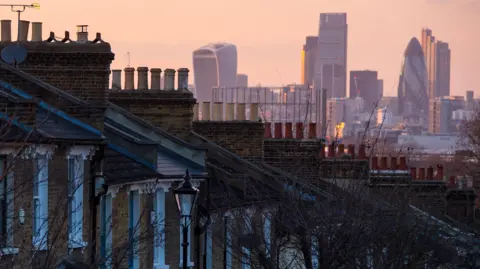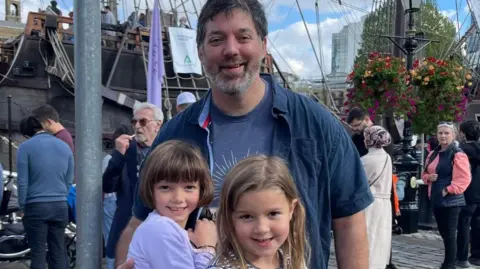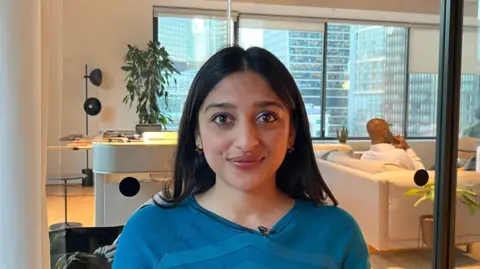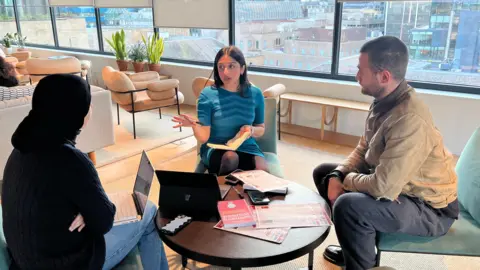'There is no surplus after the cost of our rent'
 BBC
BBCAndy Coley's story is an increasingly familiar one for London families in the private rental sector. The 48-year-old spends £2,200 a month renting a three-bed house in Hither Green, south-east London, with his wife and children.
"The cost of our rent means there's no leftover surplus of anything," Mr Coley said.
"It's all being spent on the week to week and month to month. Any spare money gets sucked into the now and not the future."
His experience echoes the findings of a survey by pollsters Ipsos, commissioned by London Councils, which found that 75% of Londoners put the cost of living as their top concern last year.
 PA Media
PA MediaThat figure was even higher among private renters, with 83% citing the cost of living as their biggest concern.
It is the third year in a row that Londoners have ranked it the biggest issue in the annual Survey of Londoners, which looks at attitudes to issues including housing, transport and crime.
Labour councillor Claire Holland, who chairs London Councils, which represents the 32 boroughs and the City of London Corporation, said the data was a "stark reminder" of the challenges facing Londoners.
 Andy Coley
Andy ColeyHousing affordability was the second-biggest issue for Londoners with 59% of people surveyed citing it as a top concern last year.
More than half of Londoners who rented were concerned their landlord would increase their rent and 48% of Londoners thought they might have to move home if their rent increased.
Mr Coley, who teaches neuro-linguistic programming techniques, wants to continue living in London, but the high cost of private renting and other household expenses are making him consider moving elsewhere for a better quality of life.
"Not only is rent more expensive, all the bills associated with the house are more expensive," he said.
"Everything's just been going up and up and up, so it really impacts us being able to save and [not] having money left over, after what the kids need and food."
The government has promised to build 1.5m new homes by 2029 and has set a target for London to build 88,000 homes a year, which a spokesperson for the Ministry of Housing, Communities and Local Government (MHCLG) said was "the most effective way of improving affordability for renters" in London.
It also outlined proposals to require councils that cannot meet their homebuilding targets to identify "lower-quality" green-belt land that could be redesignated as "grey belt" for new homes.
Over half of the Londoners questioned in the survey said they supported the idea of building on green-belt land which has previously been built on - the so-called grey belt.
Travel costs cited as barrier to employment
Londoners' attitudes to employment were tested in the annual survey for the first time.
While 72% of those in work said they were satisfied with the flexibility of their role, the survey found that low pay, job flexibility and travel costs were the main barriers to employment.
Sonya Barlow, 32, from west London, runs a business consultancy called the LMF Network. Her staff work from home most of the time, which she said helped with their commuting costs and made them more productive.

"As somebody who used to commute three hours to work every day, I understand the frustrations," Ms Barlow said.
"It's not just the transport, it's the coffee meets, the lunches that end up being expensive, the expectation that you have to do team building after work and you have to expense that yourself."
When her team meet in a WeWork co-working space once a month Ms Barlow pays for their lunch, and she thinks other employers should consider subsiding expenses such as food or transport for young professionals.

Tube fares in London are due to go up this year as the mayor of London ends his fares freeze.
A spokesperson for Sir Sadiq Khan said: "The mayor understands how worried Londoners are about costs and making ends meet, which is why he has decided to freeze bus and tram fares for the sixth time since 2016."
NHS waiting times
Other key findings in the survey include more than half of Londoners citing crime and policing as their third biggest issue of concern. Key worries included fraud, robbery and knife crime.
Just under half of Londoners questioned were worried about NHS and GP services, and almost two thirds said they continued to view long waiting times as the biggest problem facing the healthcare system.
But the report found growing optimism that public services would improve, with 40% thinking that in 2024, compared with 36% in 2023.
And nearly half of Londoners supported more devolution - the transfer of powers from central government to councils.
Listen to the best of BBC Radio London on Sounds and follow BBC London on Facebook, X and Instagram. Send your story ideas to [email protected]
